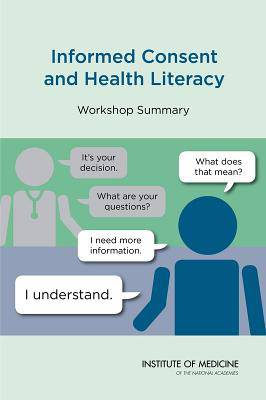
- Afhalen na 1 uur in een winkel met voorraad
- Gratis thuislevering in België vanaf € 30
- Ruim aanbod met 7 miljoen producten
- Afhalen na 1 uur in een winkel met voorraad
- Gratis thuislevering in België vanaf € 30
- Ruim aanbod met 7 miljoen producten
Informed Consent and Health Literacy
Workshop Summary
Institute of Medicine, Board on Population Health and Public Health Practice, Roundtable on Health LiteracyOmschrijving
Informed consent - the process of communication between a patient or research subject and a physician or researcher that results in the explicit agreement to undergo a specific medical intervention - is an ethical concept based on the principle that all patients and research subjects should understand and agree to the potential consequences of the clinical care they receive. Regulations that govern the attainment of informed consent for treatment and research are crucial to ensuring that medical care and research are conducted in an ethical manner and with the utmost respect for individual preferences and dignity. These regulations, however, often require - or are perceived to require - that informed consent documents and related materials contain language that is beyond the comprehension level of most patients and study participants.
To explore what actions can be taken to help close the gap between what is required in the informed consent process and communicating it in a health-literate and meaningful manner to individuals, the Institute of Medicine's Roundtable on Health Literacy convened a one-day public workshop featuring presentations and discussions that examine the implications of health literacy for informed consent for both research involving human subjects and treatment of patients. Topics covered in this workshop included an overview of the ethical imperative to gain informed consent from patients and research participants, a review of the current state and best practices for informed consent in research and treatment, the connection between poor informed consent processes and minority underrepresentation in research, new approaches to informed consent that reflect principles of health literacy, and the future of informed consent in the treatment and research settings. Informed Consent and Health Literacy is the summary of the presentations and discussion of the workshop.
Specificaties
Betrokkenen
- Auteur(s):
- Uitgeverij:
Inhoud
- Aantal bladzijden:
- 192
- Taal:
- Engels
Eigenschappen
- Productcode (EAN):
- 9780309317276
- Verschijningsdatum:
- 4/04/2015
- Uitvoering:
- Paperback
- Formaat:
- Trade paperback (VS)
- Afmetingen:
- 152 mm x 229 mm
- Gewicht:
- 317 g

Alleen bij Standaard Boekhandel
Beoordelingen
We publiceren alleen reviews die voldoen aan de voorwaarden voor reviews. Bekijk onze voorwaarden voor reviews.











